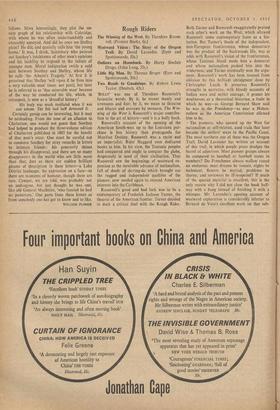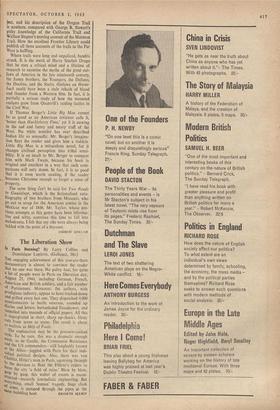Rough Riders
The Winning of the West. By Theodore Roose- velt. (Premier Books, 6s.)
Outlaws on Horseback. By Harry Sinclair Drago. (John Long, 35s.)
'BULLY' was one of Theodore Roosevelt's favourite words. By it, he meant manly and strenuous and fine; by it, we mean to threaten and bluster and overawe by menaces. The Win- ning of the West is Roosevelt's major contribu- tion to the art of history—and it is a bully book.
Roosevelt's account of the opening of the American South-west up to the Louisiana pur- chase is less history than propaganda for Manifest Destiny. Roosevelt was a racist and an imperialist; Rider Haggard even dedicated books to him. In his view, the Teutonic peoples had conquered and ought to conquer the globe, desperately in need of their civilisation. Thus Roosevelt saw the beginnings of westward ex- pansion as the inevitable advance of nationalism, full of deeds of derring-do which brought out the rugged and independent qualities of the pioneer, now needed again to expand American interests into the Caribbean.
Roosevelt's good and bad luck was to be a 'contemporary of Frederick Jackson Turner, the theorist of the American frontier. Turner decided to duck a critical duel with the Rough Rider. Both Turner and Roosevelt exaggeratedly praised each other's work on the West, which allowed Roosevelt some contemporary fame as a his- torian. But Turner's thesis of the independent, non-European frontiersman, whose democracy was the product of the backwoods life, was at odds with Roosevelt's vision of the frontiersman, whose Teutonic blood made him a democrat and whose nationalism pushed him into the wilderness; and Turner eventually won the argu- ment. Roosevelt's' work has been rescued from oblivion by this brilliant abridgment done by Christopher Lasch. It preserves Roosevelt's strengths in narrative, with bloody accounts of Indian wars and settler courage; it prunes his weaknesses as a theoretical historian, a trade in which he was—as George Bernard Shaw said he was in the Presidency—as near a Hohen- zollern as the American Constitution allowed him to be.
The pioneers, who opened up the West for nationalism or self-interest, used trails that later became the settlers' ways to the Pacific Coast. The most northern one of these was the Oregon Trail; David Lavender has written an account of this trail, in which purple prose dredges the barrel of adjectives. Must pioneer groups always be compared to baseball or football teams in numbers? Do Frenchmen always wallow round an etnbarras, must dreams be roseate, nights be inclement, flowers be myriad, problems be thorny, and reviewers be ill-tempered? If much of the quoted material is excellent, this is the only reason why I did not close the book half- way with a bang instead of finishing it with a whimper. Mr. Lavender's opening account of westward exploration is considerably inferior to Bernard de Voto's excellent work on that sub- ject, and his description of the Oregon Trail is nowhere, compared with George R. Stewart's pithy knowledge of the California Trail and Wallace Stegner's moving account of the Mormon Trail. How the excellent Frontier Library could publish all three accounts of the trails to the Far West is baffling. Where trails were long and unpoliced, bandits struck. It is the merit of Harry Sinclair Drago that he uses a critical mind and a lifetime of research to examine the myths of the great out- laws of America in the late nineteenth century, the James brothers, the Youngers, the Daltons, the Doolins, and the Starrs. Outlaws on Horse- back could have been a stale rehash of blood and thunder from a Western film. In fact, it is partially a serious study of how the mounted outlaws grew from Quantrill's raiding tactics in the Civil War.
If Thomas Berger's Little Big Man cannot be as good as an American reviewer calls it, `better than Huckleberry Finn,' yet it is stewing in the sad and funny and meaty stuff of the West. No white novelist has ever described Indian life so sensually; Mr. Berger's imagina- tion flays the reader and gives him a redskin. Little Big Man is a miraculous novel, for it changes civilised perception into tribal sensi- bility. It is an insult to Mr. Berger to compare him with Mark Twain, because his book is original and excellent in a way that such com- parisons will only damn. In fact, it is so good that it is even worth stealing, if the reader becomes Cheyenne enough to forget a sense of property. The same thing Can't be said for Two Roads to Guadalupe, which is the fictionalised auto- biography of two brothers from Missouri, who Co out to scrap for the American armies in the Mexican war of 1846. Mr. Taylor, whose pre- vious attempts at this genre have been informa- tive and witty, contrives this time to fall into melodrama. I felt that my ribs were always being tickled with the point of a bayonet,
ANDREW SINCLAIR







































 Previous page
Previous page